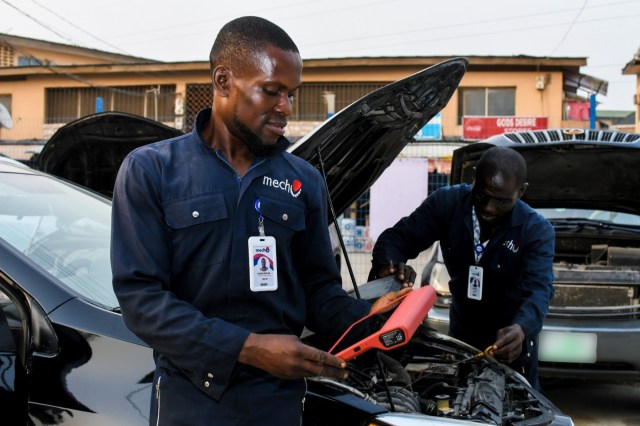Nigeria has more than 12 million registered vehicles, and approximately 90% of them are used cars that need frequent checkups to prevent recurring breakdowns. Given this number, one would expect effective vehicle maintenance to be standard in Nigeria. But that’s not the case: Most of the service providers in the country, usually auto mechanics, are inadequately trained and lack the needed tools to provide consistent, quality service.
A couple of startups like Y Combinator-backed Mecho Autotech are beginning to digitize this process. The company which connects car owners with quality vehicle repair and maintenance providers has raised a $2.15 million seed round.
The company, in a statement, said it will use the capital “to expand its multi-channel service capacity, engineering team, and marketing budget for B2C acquisition.”
In Nigeria, retail customers typically have three options for making vehicle repairs: use original equipment manufacturer (OEM) mechanics, semi-organized or aftermarket mechanics, or roadside mechanics. There are very few OEM mechanics, such as Elizade and Toyota. They provide quality but expensive services because car parts are manufactured in-house. On the other hand, the services of the aftermarket and roadside mechanics are pretty affordable to most vehicle owners, though quality varies; most times, it tilts to the flawed end.
Founded by Olusegun Owoade and Ayoola Akinkunmi, Mecho Autotech has created a network of vetted in-house and third-party mechanics with the customer affordability (of businesses and retail customers) in mind, Owoade told TechCrunch. “So what we did was create a network of vetted technicians across 35 states out in Nigeria to tackle the poor vehicle maintenance culture in Nigeria,” he said.
“We also created an insurance plan because we know that motor insurance is compulsory. So if we have an insurance plan that has an annual maintenance plan embedded, it’s more or less substituting this for the after-sales package people with brand new vehicles typically get.”
Owoade, a consultant for most of his professional career, noticed this problem during his time with pan-African trucking company Kobo360 as chief risk officer. There, he created a platform to track incidents, including law enforcement stops, arrests and accidents. But from data Owoade compiled, over 90% of incidents reported on the platform were due to mechanical breakdown.
“I became highly interested in the problem trying to understand why, and then I narrowed that down to three key things: quality of mechanics drivers engaged, poor vehicle maintenance culture, and quality of spare parts. Repairs that are supposed to take a few days would take weeks to complete.”
He reached out to Akinkunmi, who has 10 years of experience as an automobile engineer and ran a Lagos-based vehicle maintenance outfit, to start Mecho. They started working on the project in 2019 but didn’t fully launch until April 2021. The company got into YC Summer 2021 batch and currently works with 40 business-to-business customers that own over 20,000 vehicles. It has serviced over 2,000 of these vehicles.
Owoade said that Mecho Autotech decided to work with business clients first because it gave the company time to fine-tune its service. He stated that these clients, who own large fleets, typically engage with several workshops and spend over $30 million on yearly vehicle repairs and maintenance. But with Mecho Autotech, they get to deal with one single entity that coordinates these workshops for them.
To date, the company has onboarded over 7,000 third-party mechanics across three workshops in Lagos servicing B2B customers: Shuttlers, Moove, Tolaram Group and Kobo. It charges about 15% commission fees –10% from service charges and 5% from spare parts charges.
The company said it is developing a spare parts value chain that has already served over 100 third-party mechanics and several large ticket inventory purchases for B2B customers.
Part of the seed money would go into expanding this capacity. It will also help scale Mecho Autotech’s mobile application, which it launched for its B2C customers last month. The two-year-old startup said it aims to reach 25,000 customers this year and charge them a monthly, quarterly or annual subscription fee.
To reach this scale, the chief executive said his company has a success-based arrangement on the Google Play Store where it’ll employ a pay-per-download model in exchange for the platform pushing Mecho’s app. Another strategy is to use mobile services to meet retail customers at their location if they opt not to go to a Mecho Autotech workshop or partner garages.
“With B2B, what is required is a good network of workshops that has the capacity to take care of their needs. And then for B2C, it is mobile. Consumers want convenience and so mobile services works perfectly fine for them,” he said.
“What we’ve done with mobile is that we’ve created subscription-based plans for things customers would typically do with their vehicles like the routine oil change, oil filters, brake pads and [then] send our mechanics to their preferred location in our branded minibus when need be. This is how we are trying to structure our supply base tailored towards B2B and the B2C side of the business.”
The company said its round was “oversubscribed by over 300%” and claims to be the largest investment to date for a vehicle maintenance startup in sub-Saharan Africa, which is mainly because Mecho Autotech plays in a niche market with relatively few competitors. However, one that comes to mind is Autochek, whose vehicle maintenance services are just one aspect of its all-encompassing automotive business.
Investors involved in Mecho’s seed round include Future Africa, HoaQ Capital, Cathexis Ventures, V8 Capital, Silver Squid and Tekedia Capital.




